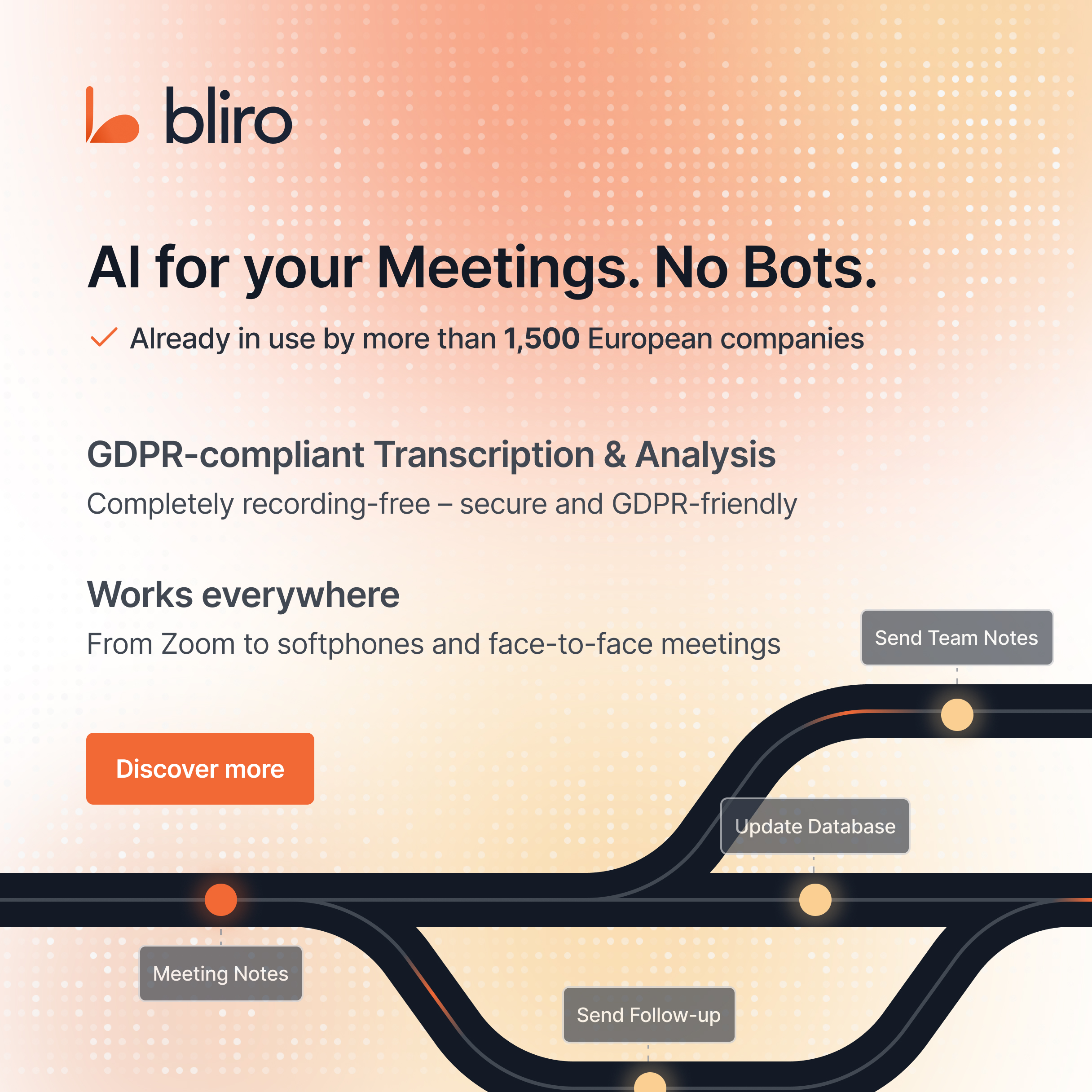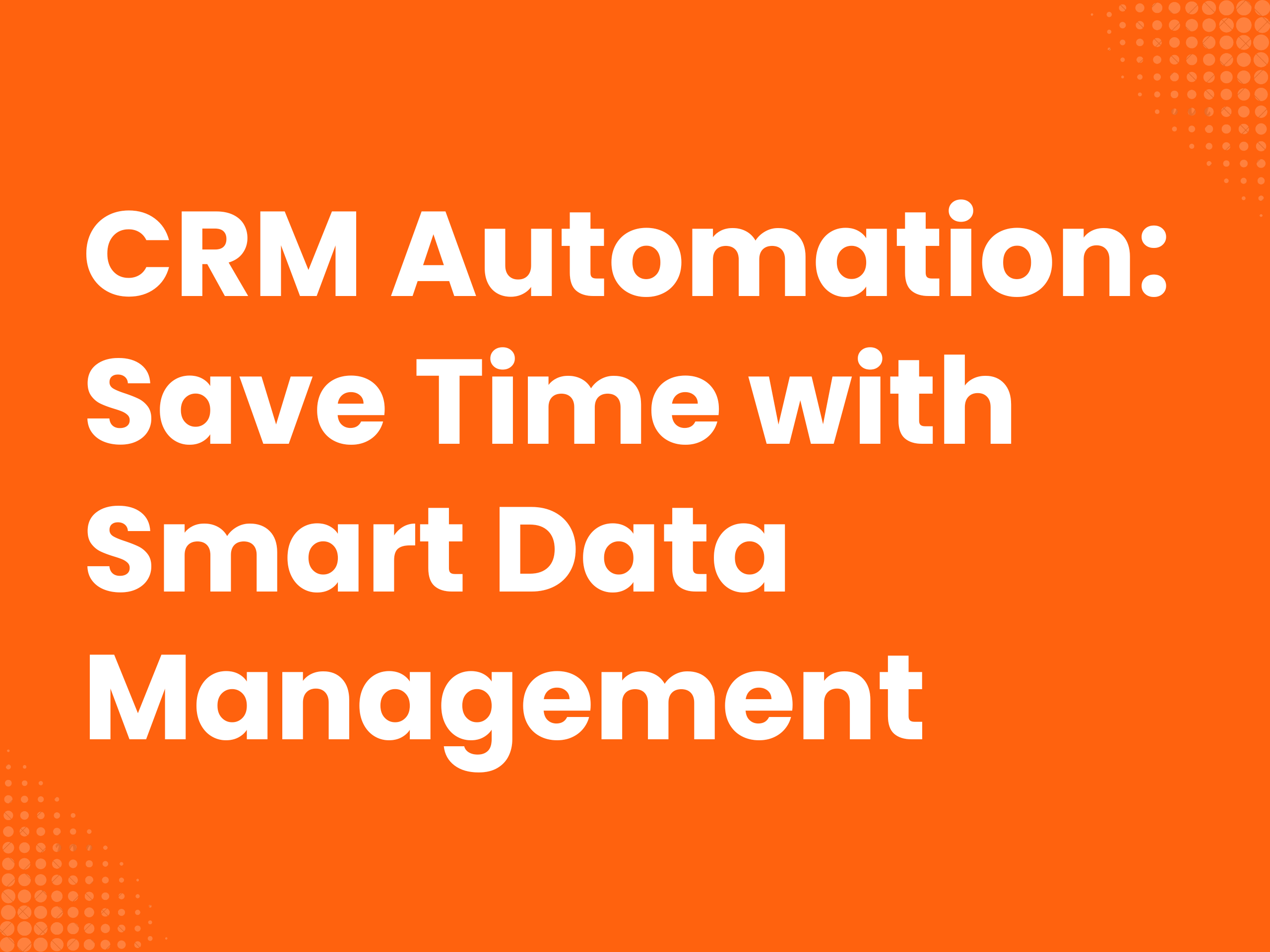70% of CRM data is outdated annually and costs companies up to 25% of turnover. Even more drastic: 66% of inside sales managers would rather clean their bathroom than maintain the CRM system. This aversion is justified employees waste 1.8 hours a day searching for information.
Clean CRM data forms the basis for successful customer relationships. Outdated or incomplete entries lead to incorrect decisions, dissatisfied customers and missed transactions. In B2B sales, 84% of respondents find manual data maintenance time-consuming and inefficient.
Intelligent automation solves that problem. Modern tools like Bliro automatically transfer meeting notes to CRM and save sales teams up to 8 hours a week. Learn how to not only save time through automated data maintenance, but also significantly improve the quality of your customer data.
Why clean CRM data determines sales success
Your CRM data determines success or failure in sales. While clean data enables accurate decisions, unmaintained data sets slow down your business.
Sales and marketing depend on data quality
Every sales activity is based on correct contact details. Your CRM analyses are only as accurate as the underlying data. This applies to all areas of business:
- Business intelligence and reporting
- 360° customer view for personalized communication
- Dashboard creation for leadership decisions
- Newsletter delivery and marketing campaigns
Even established companies are struggling with outdated data - up to 70% of your database may be out of date. High-quality CRM data, on the other hand, provides decisive customer insights and increases sales effectiveness.
The 4 pillars of high-quality CRM data
Data quality describes the “fitness for use” - how well your data serves its purpose. Four criteria determine the quality of your customer data:
- Correctness: Data reflects current reality - current addresses, valid emails, right contacts
- Completion: All relevant fields have been filled out - no missing telephone numbers or postal codes
- Uniqueness: No duplicates or multiple entries dilute your database
- Consistency: Uniform formats for addresses, dates, and categorizations
Tools like Bliro automatically ensure these quality criteria by transferring meeting content to CRM in a structured way.
Poor data maintenance costs revenue and trust
Everyone fourth data set in German CRM systems contains errors or outdated information. The MIT Sloan Management Review estimates the costs: Companies lose 15-25% of their income due to poor data quality. The Bitkom study also shows: 46% of companies damage their customer relationships due to faulty CRM systems.
The effects are measurable:
- Missed sales opportunities: Marketing reaches non-existent or incorrect contacts
- Expensive bad decisions: Wrong data leads to wrong strategies
- Damaged corporate image: Wrong salutations and repeated contact look unprofessional
- Increasing costs: Manual post-processing and falling conversion rates are straining the budget
Incomplete customer profiles prevent personalized sales strategies. The result: Everyone suffers - your company, your customers, and potential new customers.
Automated solutions such as Bliro break this vicious circle through consistent, error-free data transmission directly from customer meetings.

4 main problems of manual CRM data maintenance
Even motivated teams fail due to daily CRM data maintenance. The reality is different from theory - and practical hurdles sabotage even the best of intentions. These four problem areas show why automation is essential today.
Time-wasting manual entry: Over 40% of working time wasted
Manual data entry takes more time than expected. Over 40% of employees spend at least a quarter of their working week entering data and doing repetitive tasks. 72% The salesperson invests an hour or more in CRM updates every day.
In practice, the error rate rises significantly above the theoretical 1%:
- Typos and formatting issues
- Accidental overwriting of important information
- Data loss due to accidental deletions
- Incomplete transfers without an error message
27.5% of accounting experts confirm incorrect data entries in their companies. Gartner estimates annual losses due to bad data quality to an average of 15 million dollars.
Duplicates and outdated entries: Chaos is getting out of hand
Duplicate records frustrate teams and confuse customers. 94% of companies suspect incorrect customer and interested party data.
The most common problem areas:
- Multiple entries: Identical companies with different spellings (“GmbH” vs. “GMBH”)
- Incomplete profiles: Missing email addresses, contacts, or telephone numbers
- Outdated information: changed contacts, invalid addresses
A CRM project revealed the extent: Over 20% of Christmas cards came back - due to outdated address data. In addition to costs, the corporate image suffered.
No one feels responsible: “Not my job” mentality
Data quality becomes a secondary issue when responsibilities are unclear. “Not my job” is the most common excuse. Everyone uses the data, but no one maintains it consistently.
Larger cleaning actions are carried out “on the side.” Without clear responsibilities, new mistakes arise. GDPR requirements further increase the challenge.
Data silos: When systems don't talk to each other
Different departments use different CRM systems. The result: data silos instead of a uniform customer view.
Fragmented data is spread across spreadsheets, email programs, and separate databases. Manual consolidation is time-consuming and prone to errors.
Lack of integrations between CRM, marketing automation, and ERP systems creates inconsistencies. Customers must repeat information that they have already provided.
Modern solutions such as Bliro break this vicious circle. Automatic meeting notes end up directly in CRM - without manual input errors and without data silos.

Automation effectively solves CRM data maintenance problems
Manual CRM data maintenance costs time and produces errors. Automation offers a practical alternative that both reduces workload and increases data quality.
CRM automation: solving repetitive tasks intelligently
CRM automation optimizes recurring tasks in marketing, sales and customer service. This includes creating contacts, scheduling, reminders, and sending emails. Automated workflows keep customer profiles up to date and give teams constant access to up-to-date information.
The system automatically notifies team members of important events - new contacts, meeting requests, or status changes. This way, you won't miss any important steps in the customer process.
4 ways to automate data management
Modern CRM systems automate various areas of data maintenance:
- Workflow automation: Follow-up emails and lead qualification run according to defined rules
- Data consolidation: Information from different sources is automatically combined
- Duplicate check: The system detects and cleans up duplicate entries
- Data enrichment: Missing details such as department or email address complement the system from available sources
Companies are demonstrably increasing their efficiency through this automation. Integration with existing systems creates a uniform customer view with AI-supported insights.
AI makes CRM data maintenance more precise
Artificial intelligence takes CRM data management to a new level. AI systems gradually automate data entry, cleansing, and enrichment and keep customer data clean and accurate.
Algorithms analyze customer data and recommend suitable products or services. Natural language processing and machine learning organize and sort data that would otherwise go unused.

Bliro: Meeting notes automatically into CRM
Bliro, an AI meeting assistant, transcribes customer conversations and automatically documents structured information in CRM. The tool creates structured notes and synchronizes them directly with Salesforce, HubSpot and other popular CRM systems.
Sales teams save weekly approx. 8 hours through automated CRM data entry, GDPR-compliant, without a bot during online and on-site calls. Sales representatives and other sales representatives are completely focused on customers, while important information automatically flows into CRM.
Automated transfer avoids common CRM problems such as missing entries or duplicates through standardized input.
Implementing CRM automation successfully: 5 steps for optimal data maintenance
Successful CRM automation requires strategic planning. Without a systematic approach, even the best tools lose their effect.
Data cleansing as a first step
Start with thorough data cleansing before you implement automation processes. Up to 30% of all B2B data in CRM systems becomes obsolete every year. First remove duplicates - modern CRM systems support you with integrated duplicate checker apps. Then configure system settings that automatically prevent future duplicate entries.
CRM mapping and field mapping
Thoughtful CRM mapping forms the basis of successful automation. Sync fields in your CRM tool with the appropriate data sources. In this way, meeting notes from Bliro are automatically assigned to the correct CRM fields. Note that both fields must have the same type and format, and the target field must be at least as long as the source field.
Define rule-based workflows
Define clear workflows for standardized data updates. These workflows determine which data is processed automatically. Example: Bliro automatically updates relevant customer data after every meeting. Your team is relieved of manual data maintenance and processes remain consistent.
Comply with data protection and GDPR
Die GDPR requires transparency, earmarking and data minimization from companies. Modern CRM systems document the origin of data, manage deletion periods and consents. Make sure that your automation tool - such as Bliro - is GDPR-compliant and adequately protects sensitive customer data.
Measuring success with CRM Health Score
The CRM Health Score measures the success of your automation It rates your data in three categories: timeliness (recently updated data), accessibility (completed contact fields) and address rating (complete address fields). As a percentage, it immediately shows you where your database is and which areas still need improvement.
Conclusion
CRM automation is no longer a nice-to-have - it determines the success of your sales. Tools like Bliro automate time-consuming data maintenance and create up to 8 hours a week for valuable customer work. Meeting notes automatically end up in CRM, entry errors are a thing of the past.
The figures speak for themselves: Companies with poor data quality lose up to 25% of their turnover. Modern automation tools eliminate this risk and at the same time create the basis for data-driven decisions. Your sales reps can finally focus on what really counts - selling.
The question is not if, but when you start. Start with data cleansing, define clear workflows, and choose tools that suit your needs. Bliro and similar solutions make it easy to get started and ensure immediate improvements in your CRM quality.
Your sales team will thank you - and so will your customers.




